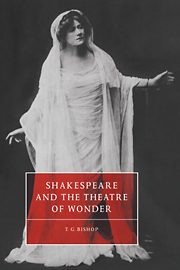Book contents
3 - Compounding “Errors”
Published online by Cambridge University Press: 07 December 2009
Summary
The sea, in fact, is that state of barbaric vagueness and disorder out of which civilisation has emerged, and into which, unless saved by the effort of gods and men, it is always liable to relapse.
W. H. AudenLet it suffice that we have not arrived at a wall, but at interminable oceans.
EmersonThe aim of this chapter is to argue that Shakespeare's Comedy of Errors provides us with an explicitly germinal model of his dramatic practice at once in its narrative, poetic and social dimensions, and that the conclusion of the work turns to the dramatic dynamic of wonder in order to enact Shakespeare's own recognition of his practice. In order to approach this intricate nexus, we must first consider the larger question of the institution for and out of which Shakespeare wrote, to suggest how he responded to changes in English society and culture by reframing the question of the work that narrative does, in effect retroping old plots in the new context of the professional theatre. Shakespeare's work is in this way informed by a revisionary conservatism by which he self-consciously subjects the stories he inherits to analysis and critique in order to regenerate them for present uses. Apparently exiled from the plays, wonder returns in the end to recoup and transfigure the scattered fragments in a reunion that speaks also to the function of dramatic narrative in Shakespeare's hands. The hyperbolic and overdetermined spectacle of wonder thus invoked becomes a site of plenitude informed in its forcefulness by the resistance of the very skepticism it has had to overcome.
Complex factors determine the transition from late medieval to Elizabethan drama.
- Type
- Chapter
- Information
- Shakespeare and the Theatre of Wonder , pp. 63 - 92Publisher: Cambridge University PressPrint publication year: 1996
- 1
- Cited by

